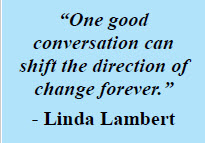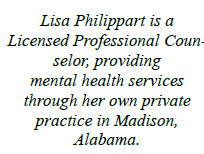 By: Lisa Philippart
By: Lisa Philippart
Difficult conversations are an unavoidable part of life. And usually what makes those conversations so challenging are all the strong emotions that come with them. For example, the anxiety and fear you feel before confronting your best friend about his/her drinking problem makes it hard to be articulate and clearly express your concerns. This conversation would be a lot less difficult if you were calm and in control of your emotions. The following suggestions will hopefully help you to get started:
Let’s begin with being strategic about time and place. Which would be better: Having a difficult conversation with your spouse in bed at 10:30 p.m. after a long and stressful day, or on Sunday morning at 9 a.m. after a good night’s sleep and nice breakfast? Too often we end up falling into difficult conversations when we are not at our best…stressed, tired, distracted, etc. I encourage you to be thoughtful and strategic about when and where you have that tough discussion. I also recommend that if possible, have that conversation outside while walking. A little movement and a bit of sunshine can do wonders for almost everyone when it comes to managing distressing emotions.
 Difficult emotions are uncomfortable, but they aren’t dangerous. Feeling ashamed can’t hurt you. But because these emotions can be painful, our tendency is to treat them like problems to be solved. For example, your spouse describes how anxious they have been at work lately, and you react by asking if he/she has tried reading that book about stress reduction you recommended! Instead, take a moment to validate emotions—to remind yourself or your spouse that it’s okay to feel whatever emotions are present. It’s like a pressure release valve that takes the edge off the emotional intensity everyone is feeling.
Difficult emotions are uncomfortable, but they aren’t dangerous. Feeling ashamed can’t hurt you. But because these emotions can be painful, our tendency is to treat them like problems to be solved. For example, your spouse describes how anxious they have been at work lately, and you react by asking if he/she has tried reading that book about stress reduction you recommended! Instead, take a moment to validate emotions—to remind yourself or your spouse that it’s okay to feel whatever emotions are present. It’s like a pressure release valve that takes the edge off the emotional intensity everyone is feeling.
I have noticed that a tendency during those difficult conversations is for people to criticize character, rather than behavior. When you generalize about people’s character or personality as a whole, it feels like an attack. This leads others to get defensive and for you to get even more frustrated and upset. For example, rather than, “Chris is always late to meetings,” try, “Last week, Chris was 15 minutes late to our meeting. And the week before, he rescheduled it twice at the last minute.” When you need to be critical, focus on the specific behaviors rather than traits, character, or personality. Address the action, not the person.

 Everybody gets defensive sometimes, and it’s especially common in difficult conversations. As you have probably noticed, your reaction to feeling defensive is to start acting defensive, which intensifies emotions and makes it harder to stay calm and have a productive conversation. Knowing this, you can anticipate defensiveness. For example, if you need to deliver some negative feedback to a close family member, you might spend 5 minutes ahead of time imagining what topics in particular will lead that person (or you) to feel defensive. For example, “I know she works really hard on throwing great parties, so my criticism about the way she handled the incident at the birthday party is likely to trigger some defensiveness in her.” The key here is that imagining defensiveness ahead of time, gives you time to prepare for it.
Everybody gets defensive sometimes, and it’s especially common in difficult conversations. As you have probably noticed, your reaction to feeling defensive is to start acting defensive, which intensifies emotions and makes it harder to stay calm and have a productive conversation. Knowing this, you can anticipate defensiveness. For example, if you need to deliver some negative feedback to a close family member, you might spend 5 minutes ahead of time imagining what topics in particular will lead that person (or you) to feel defensive. For example, “I know she works really hard on throwing great parties, so my criticism about the way she handled the incident at the birthday party is likely to trigger some defensiveness in her.” The key here is that imagining defensiveness ahead of time, gives you time to prepare for it.
This brings me to the topic of weaponizing ancient history. In high-conflict conversations, it can be SO tempting to cherry pick some event from the past and use it to “prove” your point. “Well, you’re no saint! Remember that time when things got out of control at the birthday party?” Bringing up the past as a weapon further escalates the conflict and essentially gives your counterpart permission to do the same. Of course, facts from the past can be useful in conversations, but check your motivation. Are you using this information dispassionately as a way to achieve your goals in conversation? Or are you weaponizing them and using them as a way to make yourself feel better?
We will continue this “difficult conversation” in my next article!
By: Lisa Philippart
Licensed Professional Counselor






